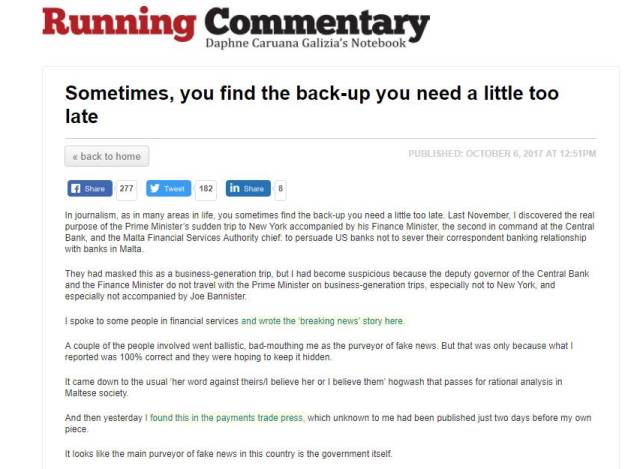 One of the last blogs on her Running Commentary website by Daphne Caruana Galizia had stated ‘There are crooks everywhere you look now. The situation is desperate.’
One of the last blogs on her Running Commentary website by Daphne Caruana Galizia had stated ‘There are crooks everywhere you look now. The situation is desperate.’
The assassination of Daphne Caruana Galizia, the tenacious and high-profile investigative journalist who reported on revelations in the Panama Papers leak, has put the affairs of the small island-nation under an intense spotlight. The 53-year-old anti-corruption activist, who was murdered when a huge car bomb blew her vehicle off the road on 16 October, wrote caustically about Malta’s politicians and banks, organised crime, cronyism, money-laundering and the alleged links between the country’s political, business and criminal elites.
Caruana Galizia’s writing had earned her many enemies, with death threats and arson attacks a regular occurrence for two decades, her son Matthew – also an investigative journalist – told the Guardian. In 2017, he said about 20 people had filed libel cases against his mother. One wealthy businessman had ‘filed 19 suits, one for every sentence in one of her articles’. The last words she wrote on her widely read blog, posted half an hour before she died, seem ominous: ‘There are crooks everywhere you look now. The situation is desperate.’
The assassination of the journalist shocked the European Union’s smallest member state, with many thousands of people rallying in the capital, Valetta, in a ‘national demonstration for justice’, Agence France-Presse reported. ‘Half a billion Europeans will not accept a journalist being assassinated,’ the European Parliament president, Antonio Tajani, declared at a ceremony renaming the press room in Strasbourg after the murdered journalist. Described as a ‘one-woman WikiLeaks’, Caruana Galizia did much to expose the offshore bank accounts and shell companies revealed in the leak of 11.5m files on tax evasion and avoidance through the Panamanian law firm Mossack Fonseca. Politico listed her as one of 28 people ‘shaping, shaking and stirring Europe’ in 2017, largely through her blog, Running Commentary: ‘On a good day, Galizia gets 400,000 readers, more than the combined circulation of the country’s newspapers (Malta’s population is 420,000).’
Amid the praise for the dead journalist, Private Eye characteristically noted that she was ‘fearless but not necessarily independent or even popular’, highlighting what it called the ‘stench of hypocrisy’ displayed by many politicians and others: ‘In life we were less generous towards the “Witch of Bidnija”.’ Condemning her murder and proposing a reward for information on her murder, the prime minister, Joseph Muscat, nevertheless told MPs that he could not pretend he liked her: ‘She had been attacking me for the past 20 years … I was her favourite target.’ Although frequently criticised as being biased against Muscat’s government, the Guardian noted: ‘While Caruana Galizia’s targets were mainly the ruling Labour party and its supporters, she had more recently turned her fire on Malta’s opposition [Nationalist Party].’ According to Private Eye, she targeted Adrian Delia’s campaign to win the leadership of the Nationalists, ‘claiming he pocketed £1m from a London prostitution racket in the 1990s, which he had deposited in a Jersey bank. She said his acolytes threatened to kill her.’ Delia had filed five libel lawsuits against her in August (swiftly dropped after her death). Both men strenuously deny any wrongdoing.
Further back, Caruana Galizia had been instrumental in exposing allegations linking John Dalli, a European commissioner until he resigned in 2012, and at one time vying to lead the Nationalists, with a Maltese businessman accused of peddling influence with a tobacco producer, Swedish Match. Dalli denied any wrongdoing and while the EU’s fraud office did not say he had accepted any bribes, it said he was ‘aware of these events’, Reuters reported.
Muscat, who had thousands of demonstrators outside his window calling for his resignation after the Panama Papers story broke last year, said after the bomb attack: ‘Everyone knows Ms Caruana Galizia was a harsh critic of mine, both politically and personally, but nobody can justify this barbaric act in any way.’ FBI agents and Dutch forensic experts were sent to Malta after he appealed for help in the investigation. The Maltese government later offered an ‘unprecedented’ $1m reward for information on the murder, Associated Press reported, but the journalist’s family called on the prime minister to resign ‘for failing to uphold our fundamental freedoms’. They added that Caruana Galizia, who had received death threats in the weeks before her murder, had ‘no longer felt safe walking down the street’.



